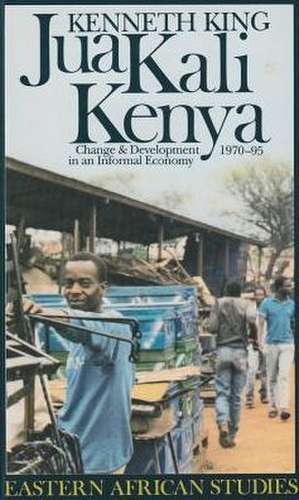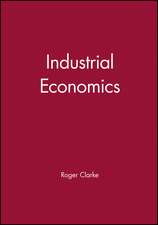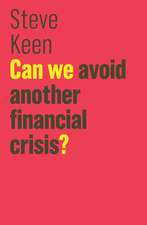Jua Kali Kenya: Change and Development in an Informal Economy, 1970–1995: Eastern African Studies
Autor Kenneth Kingen Limba Engleză Paperback – 31 aug 1996
Kenya was where the term “informal sector” was first used in 1971. During the 1980s the term “jua kali” — in Swahili “hot sun” — came to be used of the informal sector artisans, such as carworkers and metalworkers, who were working under the hot sun because of a lack of premises. Gradually it came to refer to anybody in self-employment. And in 1988 the government set up the Jua Kali Development Programme.
In this remarkable book Kenneth King brings the subject alive through the photographs and life histories of jua kali people. He has also revisited, twenty years later, many of the artisans whom he interviewed exhaustively in the period from 1972 to 1974 and about whom he wrote in The African Artisan, one of the first full-length studies to be published on the informal sector.
For donors, NGOs, and national governments, the book offers many relevant examples, and some cautions, about what has been achieved by ordinary Kenyans, mostly without government support. It will prove equally valuable for students and teachers of development policy, technology policy, and education and training policies not least because of its superb bibliography of over 700 entries related to small enterprise development.
In this remarkable book Kenneth King brings the subject alive through the photographs and life histories of jua kali people. He has also revisited, twenty years later, many of the artisans whom he interviewed exhaustively in the period from 1972 to 1974 and about whom he wrote in The African Artisan, one of the first full-length studies to be published on the informal sector.
For donors, NGOs, and national governments, the book offers many relevant examples, and some cautions, about what has been achieved by ordinary Kenyans, mostly without government support. It will prove equally valuable for students and teachers of development policy, technology policy, and education and training policies not least because of its superb bibliography of over 700 entries related to small enterprise development.
Din seria Eastern African Studies
-
 Preț: 204.38 lei
Preț: 204.38 lei -
 Preț: 279.67 lei
Preț: 279.67 lei -
 Preț: 259.52 lei
Preț: 259.52 lei -
 Preț: 252.77 lei
Preț: 252.77 lei -
 Preț: 260.45 lei
Preț: 260.45 lei -
 Preț: 270.78 lei
Preț: 270.78 lei -
 Preț: 256.63 lei
Preț: 256.63 lei - 23%
 Preț: 480.66 lei
Preț: 480.66 lei -
 Preț: 256.63 lei
Preț: 256.63 lei -
 Preț: 260.07 lei
Preț: 260.07 lei - 23%
 Preț: 478.74 lei
Preț: 478.74 lei -
 Preț: 232.74 lei
Preț: 232.74 lei -
 Preț: 263.54 lei
Preț: 263.54 lei -
 Preț: 259.09 lei
Preț: 259.09 lei -
 Preț: 276.77 lei
Preț: 276.77 lei -
 Preț: 280.21 lei
Preț: 280.21 lei -
 Preț: 274.07 lei
Preț: 274.07 lei -
 Preț: 262.02 lei
Preț: 262.02 lei -
 Preț: 263.16 lei
Preț: 263.16 lei -
 Preț: 274.07 lei
Preț: 274.07 lei - 23%
 Preț: 471.78 lei
Preț: 471.78 lei -
 Preț: 232.38 lei
Preț: 232.38 lei - 23%
 Preț: 477.11 lei
Preț: 477.11 lei -
 Preț: 257.18 lei
Preț: 257.18 lei -
 Preț: 236.02 lei
Preț: 236.02 lei -
 Preț: 208.49 lei
Preț: 208.49 lei -
 Preț: 278.30 lei
Preț: 278.30 lei -
 Preț: 286.90 lei
Preț: 286.90 lei -
 Preț: 257.78 lei
Preț: 257.78 lei - 55%
 Preț: 90.92 lei
Preț: 90.92 lei - 23%
 Preț: 485.86 lei
Preț: 485.86 lei -
 Preț: 258.49 lei
Preț: 258.49 lei -
 Preț: 257.92 lei
Preț: 257.92 lei -
 Preț: 258.35 lei
Preț: 258.35 lei -
 Preț: 241.86 lei
Preț: 241.86 lei -
 Preț: 223.05 lei
Preț: 223.05 lei - 19%
 Preț: 480.21 lei
Preț: 480.21 lei -
 Preț: 258.49 lei
Preț: 258.49 lei -
 Preț: 258.06 lei
Preț: 258.06 lei -
 Preț: 240.86 lei
Preț: 240.86 lei -
 Preț: 240.51 lei
Preț: 240.51 lei -
 Preț: 241.64 lei
Preț: 241.64 lei
Preț: 235.80 lei
Nou
Puncte Express: 354
Preț estimativ în valută:
45.13€ • 49.04$ • 37.94£
45.13€ • 49.04$ • 37.94£
Carte tipărită la comandă
Livrare economică 21 aprilie-05 mai
Preluare comenzi: 021 569.72.76
Specificații
ISBN-13: 9780821411575
ISBN-10: 0821411578
Pagini: 256
Dimensiuni: 140 x 216 x 15 mm
Greutate: 0.35 kg
Ediția:1
Editura: Ohio University Press
Colecția Ohio University Press
Seria Eastern African Studies
ISBN-10: 0821411578
Pagini: 256
Dimensiuni: 140 x 216 x 15 mm
Greutate: 0.35 kg
Ediția:1
Editura: Ohio University Press
Colecția Ohio University Press
Seria Eastern African Studies
Recenzii
“King's Jua Kali Kenya is long overdue. Recently, there has been an explosive growth in world-wide interest in the informal sector as a panacea for the problems of poverty and unemployment. This interest is driven by crisis, great and growing need, and a conspicuous lack of viable options, yet the human realities of life in the informal sector remain largely a mystery. Many, perhaps most, of the current informal sector initiatives are not sufficiently well informed by a clear sense of what support measures are likely to work in future, much less about what has worked in the past. Many mistakes are being made, and many opportunities lost, with much avoidable human suffering.
"In response, Jua Kali Kenya offers a uniquely historical and exceptionally well informed perspective on the best understood ‘informal sector’ in Africa and perhaps world-wide. I know of no other country that can match Kenya’s efforts to understand the ‘informal’ sector, accept it as a viable component of an emerging economy, and incorporate informal sector planning into national policies and plans.
"The illustrations are an asset. The informal sector is famously hard to visualize especially as a ‘business’ even for a good many of those who now propose to co-opt it as a development mechanism. The pictures make the cast of characters come alive while providing a realistic picture of the sometimes harsh realities of informal sector enterprise.”
John P. Grierson, SKAT, Switzerland
"In response, Jua Kali Kenya offers a uniquely historical and exceptionally well informed perspective on the best understood ‘informal sector’ in Africa and perhaps world-wide. I know of no other country that can match Kenya’s efforts to understand the ‘informal’ sector, accept it as a viable component of an emerging economy, and incorporate informal sector planning into national policies and plans.
"The illustrations are an asset. The informal sector is famously hard to visualize especially as a ‘business’ even for a good many of those who now propose to co-opt it as a development mechanism. The pictures make the cast of characters come alive while providing a realistic picture of the sometimes harsh realities of informal sector enterprise.”
John P. Grierson, SKAT, Switzerland
Notă biografică
Kenneth King is a professor of international and comparative education and the director of the Centre of African Studies in the University of Edinburgh.








